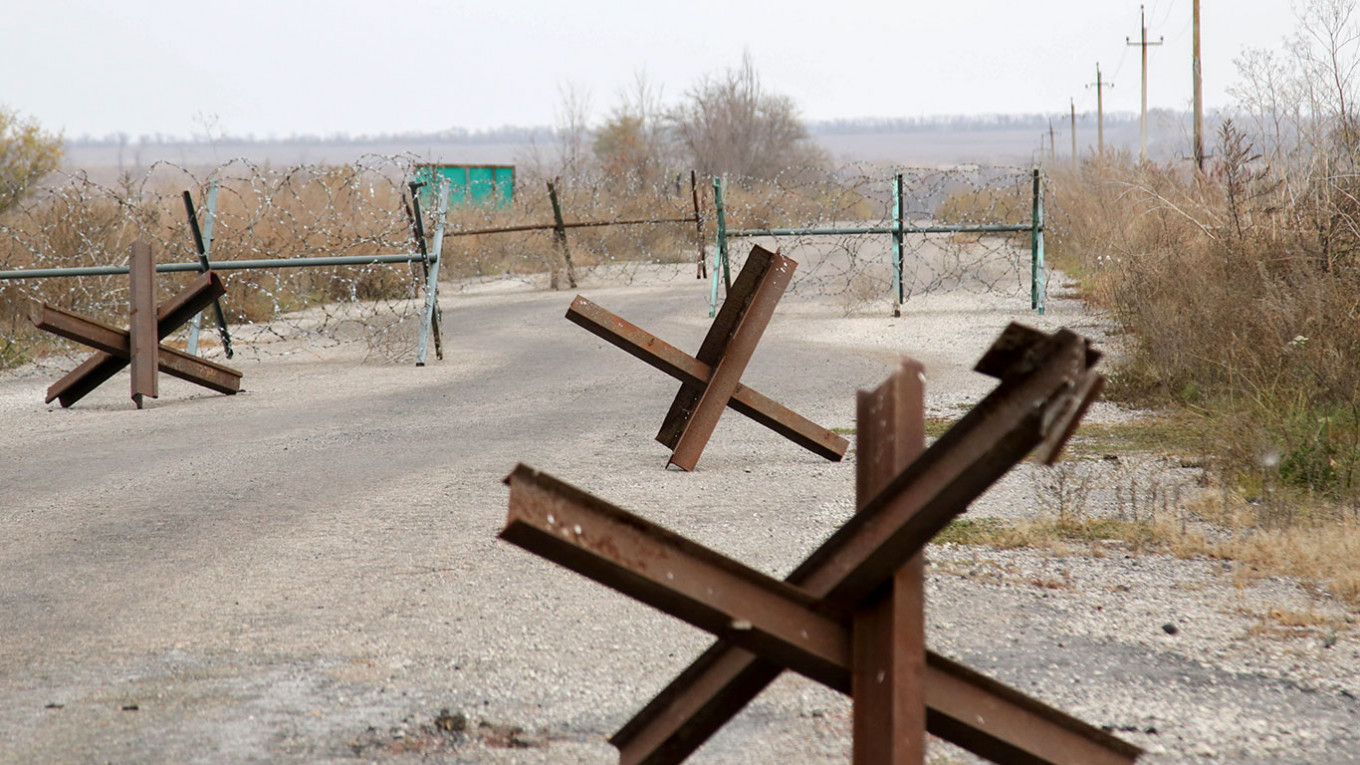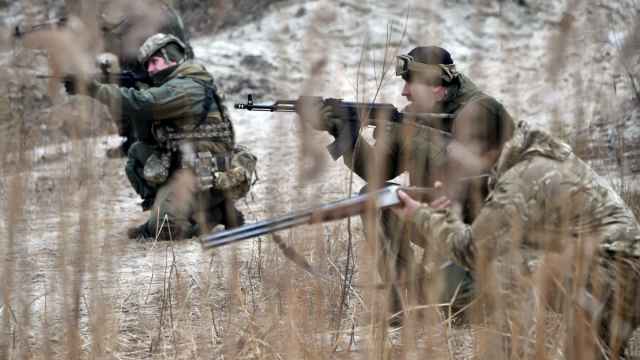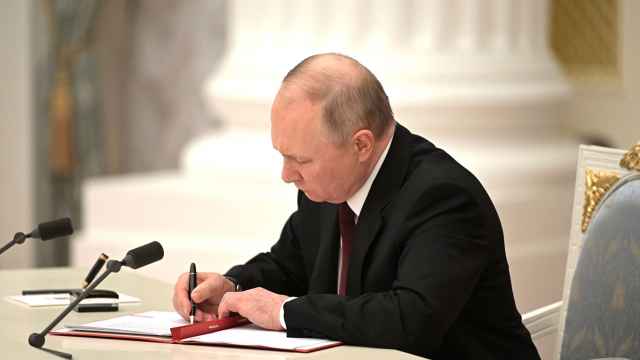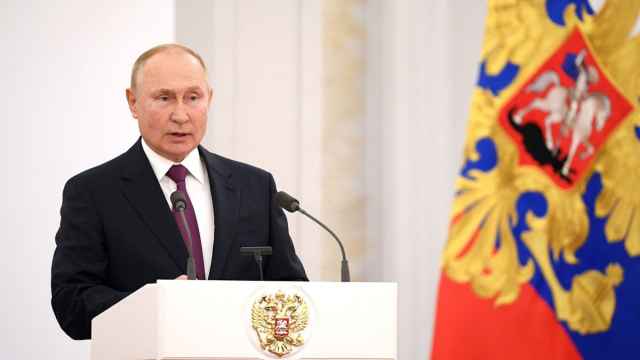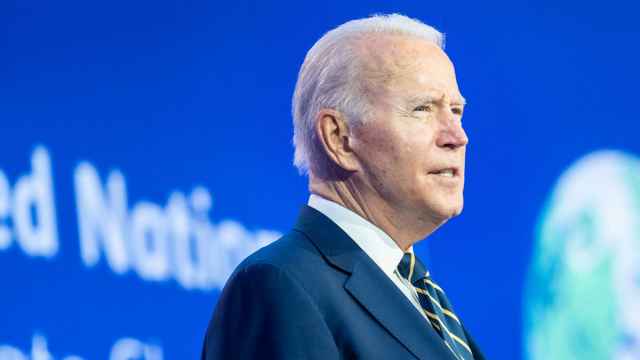In 2014, Alexander Karpak cheered on pro-Russian insurgents as they took control of his hometown in Ukraine’s Luhansk region. Eight years later, he fears the outbreak of a new war between the country he was born in and the one he has since adopted.
“To attack Ukraine would be suicidal,” said Karpak, 28, a naturalized Russian citizen who works in marketing in Voronezh, a Russian border city that is home to many refugees from the Donbas, the Eastern Ukrainian region including Luhansk and Donetsk. “But if it comes to it, I hope that Russia will defend the Donbas.”
It’s a dilemma facing many of the million or so natives of Eastern Ukraine who have moved across the border and gained Russian citizenship in recent years. Few of them relish a new conflict, but most of them can’t imagine their hometowns returning to Ukrainian control.
The Moscow Times asked Donbas natives both in Russia and in Eastern Ukraine for their views on another potential war. Many requested that their surnames be withheld to protect relatives in government-controlled Ukraine, or the separatist republics.
As the Ukraine crisis has deepened, the fate of the Donbas has increasingly been placed front and center by the Russian side.
Though Russia is widely thought to have been complicit in the creation of the Donetsk and Luhansk People’s Republics in 2014, after the two regions declared independence from Kyiv, Moscow has always denied any involvement in the conflict.
Under the 2015 Minsk-2 ceasefire accord, the Kremlin’s official position is that the Donbas should be reintegrated into Ukraine, with sufficient autonomy to prevent Kyiv from aligning with the West.
Donbas natives, however, have tended to prefer diplomatic recognition, or outright annexation of the separatist republics, which have suffered from an extended economic collapse since 2014.
“I think recognition is the only possible way of rebuilding the Donbas and restoring the economy,” said Karpak, adding that he suspects the United States is lobbying Kyiv to retake the separatist regions by force.
In recent months, Russia’s position on the Donbas has appeared to be moving in a similar direction.
In December, as an estimated 100,000 Russian troops massed on the Ukrainian border, President Vladimir Putin spoke of the Donbas with emotion, accusing Kyiv authorities of a “genocide” of the region’s Russian-speaking population.
In January, with negotiations with the U.S. over Ukraine’s Nato ambitions stalled, the State Duma scheduled a hearing urging recognition of the Donetsk and Luhansk People’s Republics as independent states.
For Donbas natives, who have spent nearly a decade living in a legal limbo, with vital documents including passports and university diplomas unrecognized by most of the world, incorporation into Russia has its appeal.
“I am for recognition, and eventually unification with Russia,” said Roman, an eighteen-year-old student nurse originally from Donetsk and now living in Moscow.
“There is no way back to Ukraine for the Donbas. Period.”
But even for Roman, who left Donetsk for Russia as an 11-year-old in 2014, after his father resigned from his Ukrainian civil service job during the Maidan Revolution in Kyiv, the emotional ties to his country of birth have not entirely vanished.
“Naturally, I love Ukraine: its beauty, its culture, its people,” he said.
“But for me, that country is still the enemy.”
Political resource
Recently, Donbas natives have become an important political resource in Russia.
Ahead of September State Duma elections, in which the pro-Kremlin United Russia party sought to defend its supermajority amid collapsing popularity, naturalized residents of the People’s Republics were permitted to vote, and bussed across the border to cast ballots.
With the Donbas vote heavily in favor of Putin’s party, Alexander Borodai, a former prime minister of the Donetsk People’s Republic, was even elected a United Russia deputy.
On Tuesday, the business daily Kommersant reported that Putin has ordered a study on granting the Donbas representation in the Russian parliament.
However, not all of Russia’s Donbas refugees share a pro-Kremlin outlook, and some of them blame Moscow for the disaster that has befallen their homeland.
For Karina, a 22-year-old student originally from Luhansk now living in Voronezh, the best solution for the Donbas would be a negotiated return to Ukrainian control.
“I haven’t lost hope that one day the conflict will be solved,” she told The Moscow Times.
“I still hope that one day Ukraine will treat Donetsk and Luhansk correctly, give them autonomy, and they’ll return to Ukraine.”
Though originally supportive of the pro-Russian militants who seized control of her hometown in spring 2014, Karina and her family fled the Luhansk People’s Republic as law and order broke down and poverty soared in the years afterwards.
“We realized that the militants weren’t behaving correctly,” she said. “They were bandits through and through."
“I haven’t forgotten that Ukraine is my homeland. I’m a Russian citizen now, and I live by Russian laws. But that doesn’t change the fact that I didn’t have a choice in coming here.”
For those who have stayed in the Donbas, the prospect of renewed war hits hardest of all.
Regular visitors speak of a largely depopulated region, with most working-age locals in Russia, and the remaining population skewed toward the very youngest and oldest.
Eighteen-year-old Donetsk resident Kirill, who asked for his surname to be withheld, plans to enlist in the Donetsk People’s Republic’s army. Contacted over Russia’s Facebook equivalent VKontakte, he was pragmatic about matters.
“I’m not too worried. Obviously, a full-scale war would be bad, but whatever will be will be,” he said.
“I was born in Ukraine, and spent the best years of my life there. It’s sad it turned out like this.”
A Message from The Moscow Times:
Dear readers,
We are facing unprecedented challenges. Russia's Prosecutor General's Office has designated The Moscow Times as an "undesirable" organization, criminalizing our work and putting our staff at risk of prosecution. This follows our earlier unjust labeling as a "foreign agent."
These actions are direct attempts to silence independent journalism in Russia. The authorities claim our work "discredits the decisions of the Russian leadership." We see things differently: we strive to provide accurate, unbiased reporting on Russia.
We, the journalists of The Moscow Times, refuse to be silenced. But to continue our work, we need your help.
Your support, no matter how small, makes a world of difference. If you can, please support us monthly starting from just $2. It's quick to set up, and every contribution makes a significant impact.
By supporting The Moscow Times, you're defending open, independent journalism in the face of repression. Thank you for standing with us.
Remind me later.



